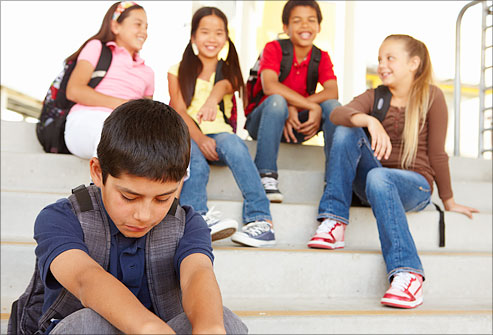Anti-bullying curriculum has created a generation of kids who are much more aware of overt, classic bullying. However, bullying and peer pressure take many forms, and at times can be very difficult to spot. One alarming trend happening in some school cafeterias is kids facing pressure to not eat lunch, or to eat much less than they actually want.
This troubling practice is becoming more common, according to Dana Thompson, a registered dietitian who works with families through her diabetes practice in Glendale, Arizona. "One of the things that is being reported is the significant amount of peer pressure exerted by certain girls to 'not eat lunch,'" she says. "Girls are avoiding eating or throwing out their lunch for fear of rejection by cliques."
Thompson explains this is an act of bullying because it appears to be pressure applied purposefully -- that is, the victim is targeted with dirty looks if she eats her lunch or indirect statements intended to make her feel ashamed about how much she eats.
Brina Jergenson, a registered dietitian in Chandler, Arizona, who has worked in the area of eating disorders for the past 20 years, agrees this is an issue, based on her experience working with kids in elementary school, junior high and high school. "The culture at lunch seems to have changed to it being more acceptable for kids to not eat lunch than to eat lunch," she says. Jergenson adds that it's particularly troublesome as kids get older and there is less lunchroom supervision.
The effects of bullying have been researched and well-publicized. Children who are bullied are much more likely to experience depression and anxiety, or even attempt suicide. Bullying has also been linked to disordered eating patterns and even clinical eating disorders.
The concept of kids being teased about their weight is not new, but the methods of teasing have gotten more subtle as anti-bullying efforts have increased in schools. Rather than taunts in the classroom, the methods of fat shaming may now be less obvious, such as remarks on social media pictures and targeted eye rolling in the lunchroom.
What's more, all kids are potentially vulnerable to body shame bullying, not just those who are overweight. Research has demonstrated, for example, that it's not unusual for a normal weight teen girl to believe she is fat. Boys are not immune, either. It has been shown that almost a third of adolescent boys desire a thinner body shape, and research indicates boys are equally susceptible to peer pressure about body image as girls.
One recent study published in the journal Appetite demonstrates a link between bullying experiences and meal skipping. Researchers used a cross-sectional survey of about 5,100 Canadian middle and high school students, and found those adolescents who reported being bullied or cyber-bullied were also more likely to frequently skip breakfast. What is not clear is why they are skipping breakfast. Is it a direct result of the bullying, or an effort to get thin and fit in? Another possibility is a decrease in appetite due to the anxiety of being bullied.
What can be done? Thompson suggests parents ask their kids what they ate for lunch. She admits kids may not want to confess that they threw their lunch away, but it does give them the opportunity to bring the issue up. She also suggests better lunchroom monitoring for the problem, paying close attention when someone is skipping lunch.
"If kids tell you they are not hungry at lunch they are lying," she says. Some actions that might help are not allowing the kids to hang out in the cafeteria if they are not eating and requiring a permission slip from parents if a kid wants to skip lunch more than once.
Fuente: news.yahoo.com
